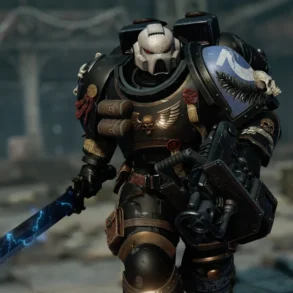A hard-earned thirst needs a big, cold beer, as the jingle goes. American backpackers Liv (Jessica Henwick) and Hanna (Julia Garner) have run out of cash and need a temporary job, which is why they find themselves on a bus heading up to the crossroads where you turn off for the Royal Hotel, a shabby old pile with wooden balconies. It’s ground zero in Australian director Kitty Green’s unsettling new film about young women negotiating their way through an uncomfortable world.
In the red dust country around the Royal Hotel, men are rarely short of a thirst, hard-earned or not. Preferably, the requisite cold beer should be served by a girl with a cheerful grin and at least a hint of sexual availability. You could try smiling once in a while, pub owner Billy (Hugo Weaving) tells Hanna, who looks as if she might never smile again. Her friend Liv rolls with the tide more easily. When Billy refers to Hanna casually as “a smart c—” she is ready to go home; Liv smooths her ruffled feathers. “It’s a cultural thing!” she says. True enough: there are plenty of cultural things going on here.
Hugo Weaving plays pub owner Billy in The Royal Hotel.
“I made it for Australians to talk about, that aspect of drinking culture, the aggression that starts to arise where everyone’s had a little bit to drink,” says Green, 39. We are in Spain at the annual film festival in San Sebastian, ironically enough the city with the heaviest concentration of bars in the world. “It can escalate, it feels threatening – ‘I’m not sure if I’m in trouble’, ‘I’m not sure if I’m safe or not’ – it feels dangerous.”
Green’s interest is in the unspoken threat, the joke underscored with hostility, the myriad small jibes women sidestep to keep things pleasant. “That kind of weird grey area. The whole movie kind of exists in that space. But that culture is universal. It’s in pubs here, it’s in pubs everywhere.”
Kitty Green on the set of The Royal Hotel, which was filmed at a disused bar in Yantina in South Australia.
Green’s last film was The Assistant, the bleakest and best of the small crop of #MeToo films that came out just as COVID-19 started closing cinemas. In a beige, strip-lit space, office newbie Jane – also played by Julia Garner – waits on the whims of an unseen movie mogul who barks or phones orders from his inner sanctum. It was Green’s first fictional film after a substantial career making documentaries. It was set in America and obviously grounded in the Weinstein case, but Green made the office – which Jane shares with two young men who routinely belittle her – feel like an alien planet.
The Royal Hotel was inspired by another true story, recounted in Pete Gleeson’s 2017 documentary Hotel Coolgardie, of two Finnish backpackers who found jobs in a hotel in regional Australia and barely survived the ordeal. Green saw it when she was judging a competition for Australian documentaries. “It’s a very observational documentary about two Scandinavian women dealing with these Aussie men in an outback pub,” she says. “It was a culture clash, it was gendered, it was everything I was interested in. Immediately I was thinking this scenario could be not only a good subject, but a good role for Julia.”
The Royal Hotel was inspired by the documentary Hotel Coolgardie, which looked at the experiences of two Finnish backpackers at an outback pub.
As Hanna, Garner’s face is permanently pinched with wary disapproval. She is the female counterpart to Gary Bond’s uppity English high school teacher in Ted Kotcheff’s 1971 landmark film Wake in Fright, an obvious reference point; like him, she is a fish out of water who Australians might think could do herself a service by breathing a little more easily. Which is interesting, says Green, because audiences in America, where the film has screened at festivals, never think she should just loosen up. “The film plays very differently,” says Green. “It’s really weird because I tested it in Sydney and then we screened it in America and I was like, ‘Oh, right, it’s like a whole other movie in America.’”
Green’s background places her in an ambivalent relationship with this beery world, as an insider with an outsider’s perspective. “My dad grew up in a pub,” she says. “My granddad owned a pub just outside Wentworth, near Mildura. My mother was a Ukrainian immigrant who arrived in the country not speaking any English and having to figure out her way through that. So I think as a kid I grew up able seeing things from both perspectives, feeling a part of two different communities. It felt like something I could naturally take on.”
Kitty Green (right) on the set of The Assistant with Julia Garner, who also stars in The Royal Hotel.
“But it is an interesting thing. On the first few days of the shoot I remember I’ve got the Aussie crew and the American actors and I feel very divided about where my allegiances lie, you know what I mean? It was an interesting battle. But it just took a minute for everyone to get to know each other and for it to feel like one thing.”
Of course, any woman is a kind of outsider here. Green says she never thought of the parallel between censorious Hanna and the teacher in Wake in Fright, partly because the original documentary was her starting point and partly because she was drawing on her memories.
“My own travels, feeling fearful and not knowing if I should speak up about that – that is probably a personal thing,” she says.
But while the film is full of that prickle of discomfort, there is an authentic bonhomie in the hotel bar. Green wrote the script with actor and playwright Oscar Redding, who grew up in the bush. “He brought a lot more of that voice than I would naturally write, the way that they speak and the tone and rhythm,” she says.
That voice is often very funny, which left some European critics in San Sebastian disconcerted – were they supposed to laugh? Well, yes, they were. These men are not cartoon baddies, which is part of the point.
“I felt like we cast the right people, and they brought a humanity to everyone,” says Green. “No one felt 2D. That’s what we were afraid of going in, that they would feel like villains. But these men are all desperate for connection, they’re trying their hardest to get to these girls and just failing in different ways. We were searching for the right people who had that kind of experience.”
Liv (Jessica Henwick,) Hanna (Julie Garner) and Matty (Toby Wallace). The Royal Hotel examines Australia’s drinking culture.
She laughs: “They’ve all spent a lot of time in pubs, those guys. Who would have thought?” They also had to understand what the film was about. “We took the script to one actor who said he’d like to play the role, but he’d want to come back and save the girls in the end. So we were saying no, not that person. That’s not it.”
That unnamed actor was not the only person who expected a film about two young women in the outback to play out as a horror film. Green plays with that expectation; she can hardly avoid it. Some of the production details, such as the dead pickled snake in a jar behind the hotel bar, have been interpreted as horror tropes that were never intended to be. “My grade 4 teacher had a snake in a jar in the classroom in Northcote, so I feel like that’s sort of an Australian thing,” says Green. “It’s something we saw in a pub and we thought it was interesting, I guess.”
Julie Garner in The Royal Hotel. Director Kitty Green wanted to subvert expectations around what happens to women in the outback.
In this outback light, however, everything looks lurid. “As soon as you see those girls in a remote setting with backpacks on, you assume they’re going to die,” says Green. “Or that they’ll be attacked violently. And we are trying to challenge that, essentially. This was our intention going into it, but it was reaffirmed on the set in Adelaide, when some people came from the government – I can’t remember what their role was – and were watching a scene of the girls in the pub on the monitor.”
Loading
“One of them said to me, ‘It looks great, but why do the girls have to die?’ And I said, ‘They don’t die’. And she said, ‘Oh, but I just assumed!’ How crazy is that? That to make a film that is just about these girls who are figuring themselves out and finally carving out some strength that establishes who they are in that space is so radical! It’s nuts, you know? But it just comes literally from backpacks. That’s enough. So it became about subverting that genre, those expectations. Giving them something different, denying them the violence they’re hoping to see, which aggravates some viewers who want that climax.”
Accordingly, critical responses from festivals in Telluride and Toronto have ranged from ecstatic to dismissive. “Reviews I’ve been reading on Letterboxd say things like, ‘It bubbles away, but it never reaches boiling point’. As if they want that [violent] scene for it to be a movie, that’s the bit that’s missing. But I can highlight these aspects of behaviour, I can talk about what I want to talk about, without having a rape scene, without having violence. You never need it: the threat of violence is enough. And it’s enough for us to say no, take a stand and not put up with that.”
There is a hint that the girls have left some baggage behind in America, but it is never explained. “I never wanted to justify their behaviour on the basis of something that happened in the past,” says Green. “That kind of Thelma and Louise thing, saying, ‘It was because they were raped and they had to take a stand’. I just wanted to them to be in the present, saying they had had enough.”
It is not a spoiler to say that by the end of the film, they are free. The Royal Hotel didn’t kill them. It made them stronger. Whatever its faults, it gave them that.
The Royal Hotel is released in cinemas on November 23.
Find out the next TV, streaming series and movies to add to your must-sees. Get The Watchlist delivered every Thursday.
This post was originally published on this site be sure to check out more of their content.



